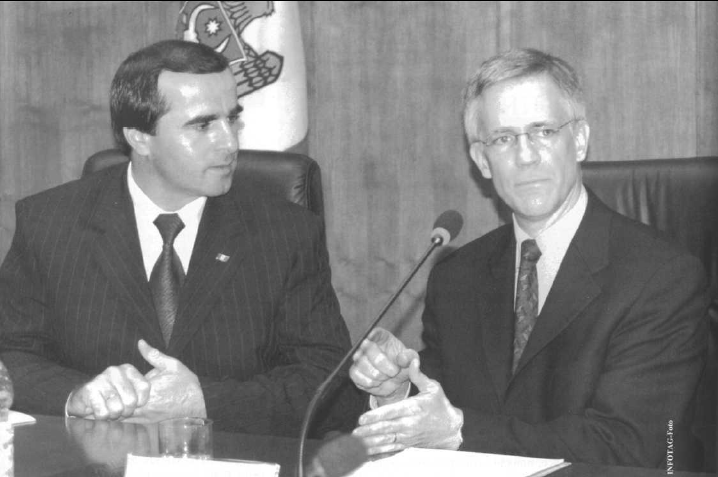|
Russian (scanned)
PROFIT (BANKS & FINANCE)
MAGAZINE
Issue No.
3,
March 2007
|
Fear Has Big Eyes, or Optimism About GDP in 2007 |
Moldova makes a claim for know-how in summarizing the missions of International
Monetary Fund (IMF) in Moldova. It has become a tradition already for the
mission to give press-conferences in tandem with the members of the government
or the National Bank. However, this happens only when result of the mission are
positive and impressive. Only with these results the head of the mission is
accompanied by the Prime-Minister Vasile Tarlev, President of the NBM Leonid
Talmaci, Ministers of Finance and Economy Mihai Pop and Igor Dodon. This time,
when the mission was giving its press-conference at the end of February, the
event was a joint one again, as Minister Igor Dodon also came to the
journalists.
If we speak about the results of another
IMF mission, in opinion of the Fund’s experts, they are quite weighty for
Moldova. The mission believes that the government and the NBM do everything
possible to meet the objectives of the memorandum signed with the fund. It
envisions a three-year cooperation program with financing of over $160 million.
However, all this money will be received by the National Bank, which would be
able to use it only in extreme situations. It would be better not to have such
situations at all, and Moldova to be able to cope with them itself.

During this visit the
IMF mission made no secret that it is optimistic about macroeconomic situation
in Moldova. Its head Thomas Richardson said that currently, IMF projections of
the economic situation in Moldova are more optimistic, than projections that the
Fund had at the end of 2006.
This is related to the fact that the government managed to conclude and
agreement on gas supply for 2007 at a more favorable price in comparison with
the one that was projected and the one that Gazprom scared us with. Moldova
managed to conclude agreement on gas import at the price of $170 for one
thousand cubic meters, which is lower than European prices the Russian gas
monopolist referred to.
The optimism of the Fund’s experts was also increased by political decision of
Chisinau and Moscow to resume export of Moldovan wine to the Russian market. It
looks like that political barrier for the trade of domestic wine products and
alcoholic beverages is removed. Now, only some minor issues remained, it is
necessary to solve some technical issues, which in reality turned out to be more
difficult than it might seem at the fist glance. In spite of highlight
declarations that Russians will see the new 2007 year in with Moldovan
champagne, it still has not left the storehouses of winemakers, though it is
already March.
And, nevertheless, political decision of the leaders of two countries fills with
optimism and hope not only winemakers, but experts of the IMF as well who
believe in soon return of Moldovan wines to the Russian market. Meanwhile, Tomas
Richardson clarifies that the volumes of wine supply will not be as impressive
as prior to the tragic date of March 27, 2006. But he also says that every cloud
has its silver lining. Richardson believes that the price range of Moldova wines
in the Russian market will be already different and more favorable for the
winemakers, however only for those who are able to produce highquality wines.
The experts of IMF are ready to confirm their confidence by specific deeds and
examples. The only wish of the Fund to change the projection of Moldovan
economic development in 2007 is worth a lot.
As far as the results
of the mission in Moldova, Richardson indicated that relations between the
government and the IMF are partnership and even good. The mission is satisfied
by implementation of the Memorandum concluded by the Fund, the government and
the National Bank. It welcomed the idea of the government to develop the
national development program with specification of the main priorities and
sources of financing.
As far as the issues that still concern the experts of the fund, Richardson
mentioned primarily inflation, which he believes slows downs the economic growth
and impedes inflow of foreign investments. But the mission expressed confidence
that as a result of the monetary policy of the National Bank and well-thought
activities of the government consumer price index will be reduced and by the
end-2007 it will not exceed 10%. For instance, trends of January 2007 versus
January 2006 already show that inflation constituted 12.6%, which is much lower
than its annual level for 2007 of 14.1%.
The Minister of Economy and Trade Igor Dodon did not hide gratitude to the IMF
for supporting the reforms of the goverenement. Without any false modesty he
said that the government “obtained successes” in structural reforms. The
Minister had no doubts that with support of IMF the government and the National
Bank will manage to suppress inflation and its low level will trigger economic
development, inflow of foreign investments and GDP growth. 
Dodon announced that a special group of IMF experts arrives to Moldova in March.
The government will coordinate with them the options of tax policy for 2008. The
Government considers several policy scenarios of tax burden reduction, including
some very ambitious ones.
In addition the minister indicated that reduction of the tax burden will not
compulsory lead to the state budget losses. He proved that by example of
corporate income tax. “In 2001, it constituted 32%, and in 2007 - 15%. However,
in spite of over than 50-percent reduction of the rate, this tax revenues in the
budget increased by five times”- mentioned Dodon.
Note of Profit:
The next mission of the IMF will arrive to Moldova at the end of
Aprilearly May 2007. Report will be written at the result of it that should be
approved in summer by the Board of Directors of the IMF.
Alexandru VASCAUTAN
|